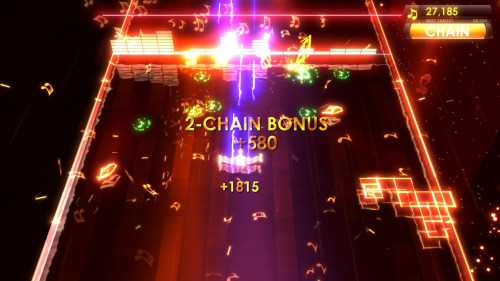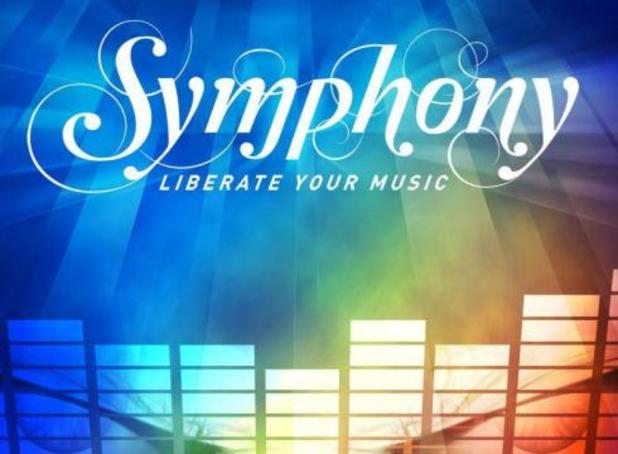Last updated on March 4, 2013
I suppose this is cheating somewhat; after all, Symphony isn’t “game music” so much as it is “a game revolving around music”. Game Music Saturdays usually covers an actual album, but nothing really caught my fancy this week, so why not cover this?
Symphony is basically a simple shooter, such as Galaga or Tempest. That doesn’t sound too interesting until you take into account its main gimmick: the ability to use your own music to not only listen to during stages, but to create them. This means, theoretically, there’s infinite replay value; like Audiosurf and Beat Hazard before it, each uses some magical algorithm to determine exactly what pace, what enemies, and how much stuff to throw at you in pace with the song. It’s an interesting idea, but I don’t think it lasts as long as people think.
For one thing, I thought Audiosurf (which basically makes songs into puzzles/avoid obstacles courses) was excellent when I first started. The first couple songs and the lower difficulties always ease you into the experience, relaxing you as you guide your little craft along a fixed race course set to the song tempo. It’s fun, enjoyable, and an interesting way to listen to music. However, it’s when the “difficulty” picks up that Audiosurf, to me, loses its way. There’s just too many elements to juggle at once, and they’re not at all clearly communicated to the player. So, I’m supposed to race along, collect colored blocks, arrange these blocks into 3 shape patterns, and not hit grey blocks (of which there are MANY) while racing at a hundred miles an hour? No thanks! Look, I’m not one to deny myself difficult experiences; I love shooters from Japan, even if my skill isn’t where I would like it to be. Still, this kind of difficulty feels cheap, random, and unfair; either it requires too much multitasking or graphics become the focus at the expense of the game.
Unfortunately, this is also the case of Symphony. The first difficulty level gets you into that same state of relaxation, but anything past that marker automatically places you in intense sesssions of trying to survive a 5-10 minute (10 minute song limit, for now) song sequence. Not only do you have to worry about score, but you also have to fear being shot or running into enemy ships. If there’s one thing I need for shmups like this, it’s an arcade joystick. Like Audiosurf before it, however, Symphony exclusively uses the mouse. Let’s say the speed settings on the ship are WAY OFF, and I find myself ramming into other ships repeatedly and often.
That’s not just because of the mouse’s inaccuracies, however; minute movements are an impossibility, sure, but if you can’t tell the difference between part of the stage and an enemy ship/missile, it makes it very hard to play well. Case in point:

It’s really, really hard to tell what’s going on with this art design. Enemy colors are the same as the screen color; when enemies die, they leave a billion musical notes that are THE SAME COLOR in their wake; enemies shoot missiles that are the same color at you. Then, enemies the same color of the stage come in from the SIDE (which doesn’t happen in any vertical shmup I’ve ever played). So, tell me: how the heck am I supposed to avoid all this stuff flying at me when I can’t differentiate what is what? The score tokens, thank God, are clearly demarcated from everything else, but placing the same color scheme for almost all aggressive units burdens the player unnecessarily.
Worst of all, there’s no real penalties of any kind for death other than a knock on your score. Rather than the thrill of completing a difficult section, the game introduces the ability to upgrade your ship. Since, for whatever reason, we have ships that swoop in places where you can’t fire at them (i.e., behind your ship), you need these upgrades to do well. How do they balance the leaderboards, I wonder? The score multiplier goes up based on your difficulty plus your weapon assortment, so that seems a fair compromise, but it appears impossible to destroy some ships without some heavy duty firepower. The game’s more like an RPG than a shmup, and that’s dissapointing. The score is meaningless unless we’re all on the same playing field, and that’s not the case here; Audiosurf has the same problem as well.
Lastly, the categorization system is, to put it lightly, screwed up. Unlike Audiosurf and Beat Hazard, which let you look up songs by file name, Symphony uses MP3 tags. This isn’t a great option for everyone, like myself – Zune software doesn’t write tags when I change song information, so about 75% of my collection is uncategorized and listed by song name. Since I don’t know the file name or name of most songs (I’m an album listener), this is extremely tedious and not fun.
I don’t know who this game is for, other than masochists who want seizures. I don’t want to be down on the game; I mean that. The concept of “play games with your music” is great, but I feel like no one understands how to execute that concept well. What is the problem?
Well, I can think of one: it absolves the developers of any need to make their own original content when it comes to music. It’s unfortunate to say, but a guided and crafted video game will always beat out a computer derived and generated algorithm. Even if a human being coded it in, it can’t show me anything more than something interesting, not a human soul on the other end. There’s a communicative element here. Like the reality that God is a person (three persons, to be exact), there’s a person who designed, developed, and created this game for other people to enjoy (and yes, make money off of that entertainment as well). When that’s missing, what you have is empty. Soulless. Devoid of personality. All the fun features in the world can’t make up for that. John 16:13 makes this apparent:
13 But when He, the Spirit of truth, comes, He will guide you into all the truth; for He will not speak on His own initiative, but whatever He hears, He will speak; and He will disclose to you what is to come.
That is, the Holy Spirit speaks to Christians and discloses what will occur. Specifically, He (as a person) communicates God’s message. It’s not a soulless spirit or force, but a person. That people confuse the issue so often shouldn’t be surprising; there’s plenty of talk about the Holy Spirit as a Force like Star Wars or other silly (yes, silly) ideas, but Scripture makes it plain that the Holy Spirit is, indeed, a person.
That’s what is missing from Symphony: humanity.

